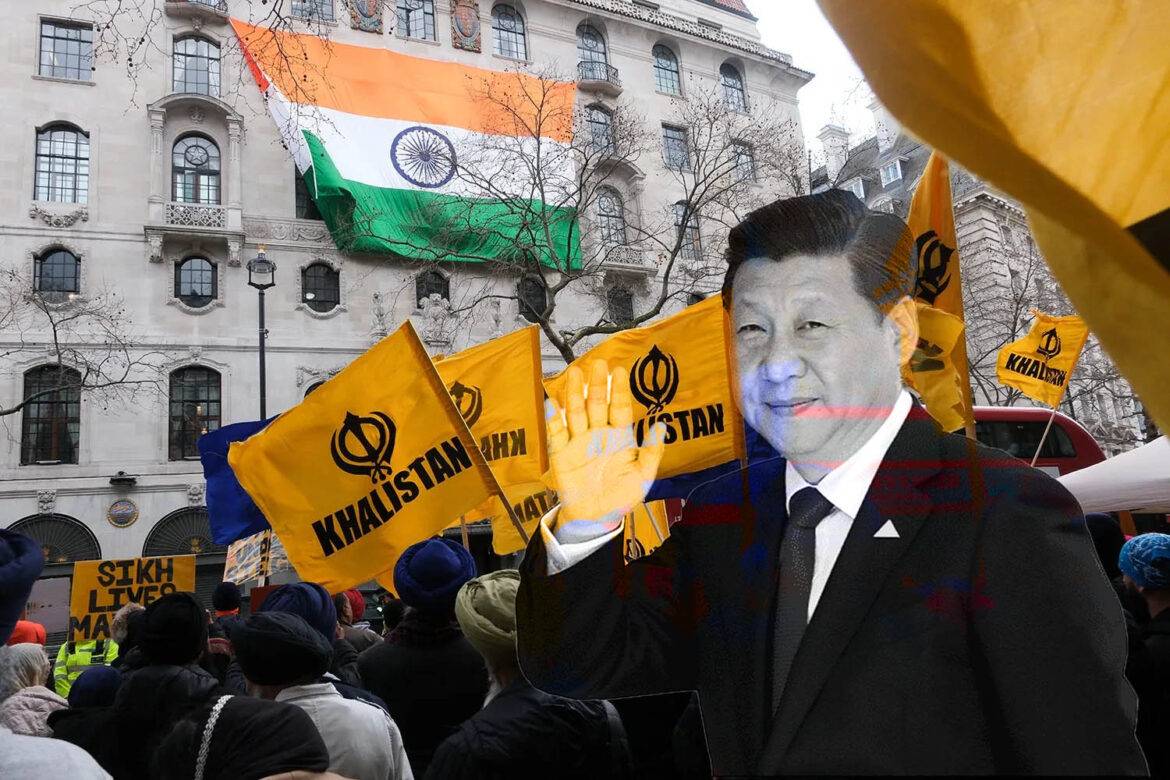AI Generated Summary
- The network’s activities included posting in English and Hindi about news and current events, including floods in the Punjab region, the Sikh community worldwide, the Khalistan independence movement, the assassination of Hardeep Singh Nijjar, and criticism of the Indian government.
- In a digital age where the battle for hearts and minds is waged as fiercely online as it is in the streets, revelations about China’s covert operations on social media are deeply unsettling.
- In 2009, a Chinese analyst using the pseudonym Zan Lue published an article for the China International Institute for Strategic Studies (CIISS), advocating for the breakup of the ‘Great Indian Federation’.
In a digital age where the battle for hearts and minds is waged as fiercely online as it is in the streets, revelations about China’s covert operations on social media are deeply unsettling. Meta, the parent company of Facebook and Instagram, has recently exposed a network of social media accounts based in China, responsible for “inauthentic behavior” targeting India. This operation, known as “Operation K,” focused on the global Sikh community, attempting to influence the debate around the killing of Khalistani separatist Hardeep Singh Nijjar in Canada.
This exposé, detailed in Meta’s Quarterly Adversarial Threat Report, revealed the creation of 37 Facebook accounts, 13 pages, five groups, and nine Instagram accounts, all in violation of Meta’s policies. The network operated under the guise of a fictitious activist movement, aiming to incite pro-Sikh protests, particularly in New Zealand and Australia. This operation was a sophisticated attempt to manipulate news and current events, using images likely altered by photo editing tools or generated by artificial intelligence.
The Global Reach of Operation K
Meta’s report underscores the extensive reach of Operation K. The network targeted the global Sikh community across Australia, Canada, India, New Zealand, Pakistan, the UK, and Nigeria. This level of coordination and the breadth of its geographical focus raise important questions about the underlying motivations and strategic objectives behind such operations.
We suspected China was actively working on the cyber defences of Khalistanis.
— Chris Blackburn (@CJBdingo25) May 31, 2024
We now know they were boosting propaganda too.@UtsavSanduja https://t.co/QFdaTBtq4i
The network’s activities included posting in English and Hindi about news and current events, including floods in the Punjab region, the Sikh community worldwide, the Khalistan independence movement, the assassination of Hardeep Singh Nijjar, and criticism of the Indian government. The primary goal appears to have been to amplify pro-Khalistan sentiment and foment dissent against India.
The Nexus of China and Khalistan
The revelation of Chinese involvement in promoting the Khalistan movement is particularly alarming. In the last decade, Khalistani activism has surged in North America, Europe, and Australia. These demonstrations, often unrelated to the host nation’s interests, focus on long-standing grievances within the Sikh community and diaspora. Analysis of statements from Khalistani leaders reveals a clear affinity and open support for the People’s Republic of China (PRC), largely due to China’s recent confrontations with India in the Himalayan region.
Think tanks associated with the Chinese government have also been exploring ways to destabilize India. In 2009, a Chinese analyst using the pseudonym Zan Lue published an article for the China International Institute for Strategic Studies (CIISS), advocating for the breakup of the ‘Great Indian Federation’. The paper suggested that China should support various separatist movements within India, including those in Assam, Tamil Nadu, and Kashmir, to establish independent nation-states.
More recently, Chinese analysts have shown interest in the Khalistan movement. Guo Xuetang, a Chinese security analyst, noted that the recent pro-Khalistan activities in European and American countries might not be accidental, hinting at a possible strategic alignment between Chinese interests and Khalistani separatism.
Sikhs for Justice and China: A Strategic Alliance?
Leading the charge in this new wave of Khalistani radicalism is Sikhs for Justice (SFJ) and its fiery leader, Gurpatwant Singh Pannun. Pannun, an American lawyer, has publicly supported China against India on numerous occasions. His anti-Indian zealotry extends beyond provocative imagery and protests to open alignment with Chinese interests.

In a letter dated June 17th, 2020, Pannun wrote to Chinese President Xi Jinping, expressing empathy for the Chinese people and drawing parallels between the Chinese experience and the plight of Sikhs under Indian rule. He ambiguously thanked the Chinese people for their support for SFJ’s call for a non-governmental referendum on the secession of Punjab from India.

Pannun has gone as far as to call for Indian soldiers to defect to China, proclaiming, “INDIA IS YOUR ENEMY, NOT CHINA.” In 2019, he also wrote to the Chinese ambassador in Islamabad, Pakistan, accusing India’s Research and Analysis Wing (RAW) of orchestrating an attack on the Chinese Consulate in Karachi and offering financial support to the affected Chinese families.
Implications for Global Security
The nexus between China and the Khalistan movement has profound implications for India and global security. China’s support for separatist movements within India is part of a broader strategy to weaken and destabilize its regional rival. By aligning with groups like SFJ, China is not only fomenting internal discord within India but also attempting to exert influence over the Indian diaspora worldwide.

The manipulation of social media to amplify pro-Khalistan sentiment is a tactic that can have real-world consequences. It can inflame tensions, provoke violence, and destabilize communities. The global Sikh community, which has long been a target of various political agendas, now finds itself at the center of a geopolitical struggle between two powerful nations.
The role of social media companies in identifying and dismantling such operations is critical. Meta’s actions in exposing Operation K are commendable, but they also highlight the ongoing vulnerabilities in digital platforms that can be exploited by state and non-state actors. The ability of foreign powers to influence domestic politics and social movements through coordinated inauthentic behavior is a clear threat to democratic processes and social cohesion.
A Call for Vigilance and Cooperation
The exposure of Operation K should serve as a wake-up call for governments, social media companies, and civil society. There is an urgent need for greater vigilance and cooperation to counter such covert operations. Governments must invest in cybersecurity and counterintelligence capabilities to detect and disrupt foreign influence campaigns. Social media companies need to enhance their monitoring and enforcement mechanisms to prevent the spread of disinformation and coordinated inauthentic behavior.
At the same time, civil society organizations and the global Sikh community must remain vigilant against attempts to manipulate their genuine grievances and aspirations for political gain. It is essential to differentiate between legitimate activism and foreign-influenced propaganda.
Navigating a Complex Future
The nexus of China and the Khalistan movement presents a complex challenge that requires a multifaceted response. It is a reminder of the intricate ways in which global geopolitics can intersect with local and regional issues. As we navigate this complex future, it is crucial to uphold the principles of transparency, accountability, and democratic integrity.
The revelations about China’s involvement in promoting the Khalistan extremist movement through Operation K should prompt a broader discussion about the role of foreign powers in domestic politics and social movements. It is a call to action for all stakeholders to work together to safeguard the integrity of our democratic processes and protect the rights and aspirations of communities worldwide.
In the end, the battle for hearts and minds will be won not just by countering disinformation, but by fostering genuine dialogue, understanding, and respect among diverse communities. As we confront these challenges, let us strive to build a world where the voices of the people are heard and respected, free from the manipulations of external powers.
The opinions expressed in this article are those of the author. They do not purport to reflect the opinions or views of Khalsa Vox or its members.




